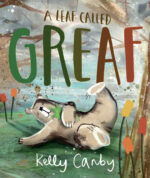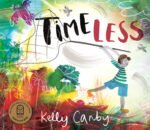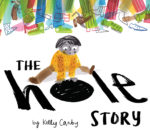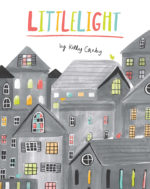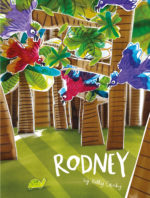Stunning new picture book by Kelly Canby is a conversation starter for talking about loss
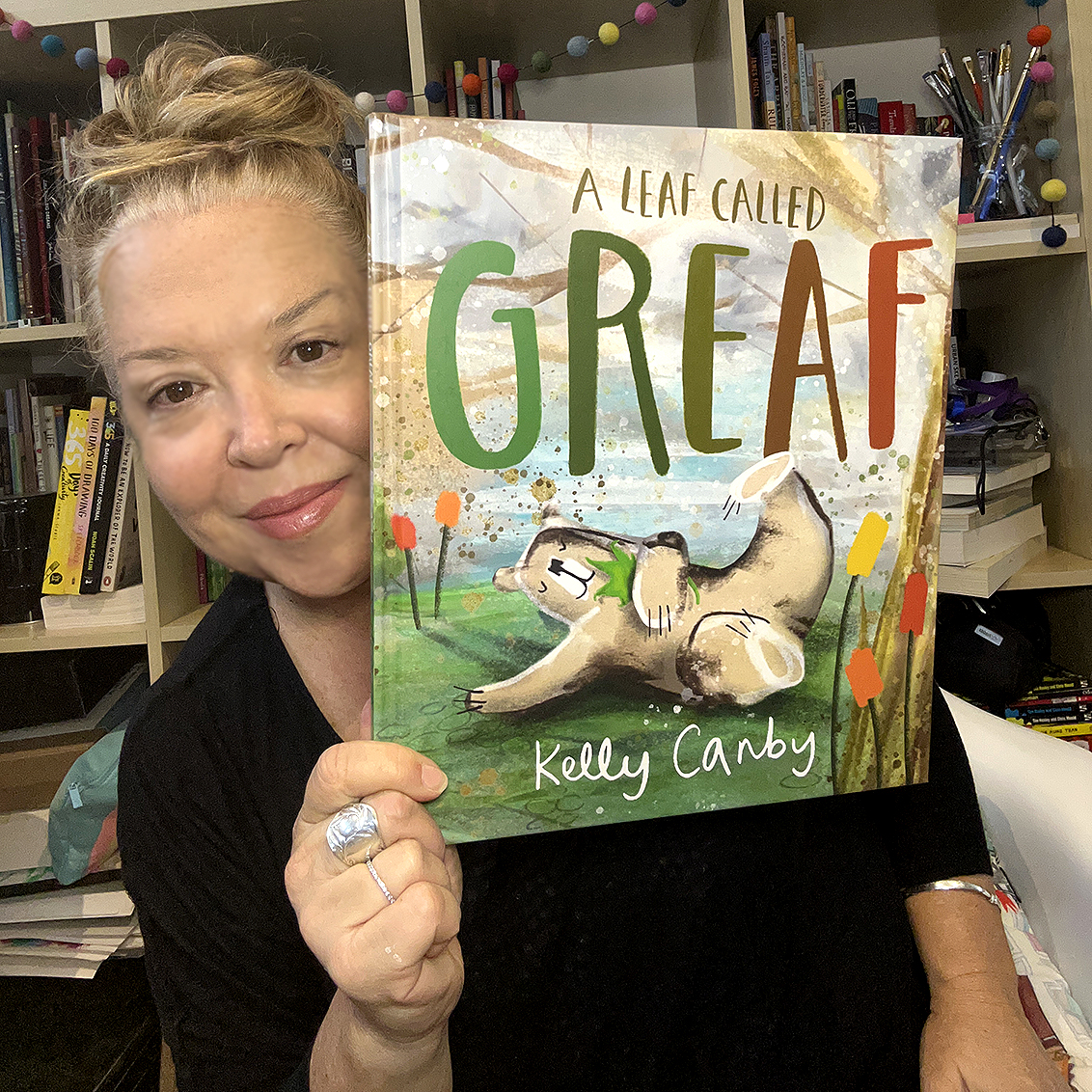
Children’s publisher Cate Sutherland said she loves working with Kelly Canby. Cate said, ‘Kelly’s work is nuanced and always evolving. She deals with sophisticated human emotions with subtlety and empathy, simplifying them so that young readers can understand themselves and others.’
Tell us about your latest book and why you wrote it.
My latest book is A Leaf Called Greaf and I wrote it because it told me to!
The idea for this book came very quickly after I picked a dried leaf up off the ground one autumn evening. I took the leaf home with me, and each time I glanced at it a new phrase or word would pop into my head. When they did, I wrote them down on a brown paper bag (I was cooking dinner at the time and the bag was all I had handy). At some point I was writing words that rhyme with leaf, and ‘greaf’ (although not a real word) was on the list. As I kept jotting my notes, the line ‘He had never felt Greaf like this before’ appeared and that was it; I ran with all the things that happened next until I had a story.
Also, I think the light rain, cool air, early dark and all-round autumnal ambience had put me in just the right mood for a subject such as this. The gate for it was open.
You were able to write grief (and greaf!) without being maudlin or didactic. Why do kids need a book about grief/greaf?
I never start my writing with a message or with the aim of trying to teach anyone anything. I start every story with a concept, an idea that interests me – a hole in the ground you can pick up; bricks in a wall you can remove to reveal windows, scale and perspective; the concept of time … from there, a story is born and inevitably a message of some type reveals itself, but it’s never planned. To be honest, sometimes the message at the end of it all surprises even me! Perhaps that’s why they’re not maudlin or didactic. First and foremost, it’s the exploration of an idea that I focus on, then I build a narrative around it.
Having said all that, when the message does reveal itself, it absolutely needs to be a worthy one or I will keep working on it until it is. Grief was worthy and I was happy to follow that line of thinking because, at some stage in our lives, we all experience grief. And for a reader, especially a young one, knowing you’re not alone in feeling the way you feel, can offer some comfort. I hope.
What’s a day in the life of a writer/illustrator look like?
Which day in particular? They’re all SO different! To answer this, I will generalise …
When I wake up, I make the first of probably way too many coffees, see to the puppy (he’s a very new edition to this ‘day-in-the-life-of’), wake my son and get him off to school, then come home and make more coffee.
I have a room at home I’ve turned into a studio, so I will head straight there and sit at my desk for thirty or so minutes staring at the wall before opening my laptop to check emails and see to all the admin type stuff. Then I will pop on a podcast (almost always it’s Armchair Expert or anything under the Armchair Expert umbrella) and start work. If I’m illustrating a book, I will stay in the studio most of the day (new puppy at my side) painting and drawing, but by around 3pm I usually have absolutely nothing left in my brain, so that’s when I go get groceries and prepare for whatever after school happenings are happening.
If I’m writing, I probably won’t be in the studio. I’ll drive my Kombi to the beach with a notebook and laptop, or sit in a (quiet) café, or I might get super cosy and plonk myself on the couch with my laptop. I can’t have too many distractions around when I’m writing, or I find it difficult to focus. I need the world to be still.
If I’m not writing or illustrating a book, I’ll be working in my sketchbook, trying out new materials, playing and experimenting. Sometimes I might even be painting a canvas. I’ve become quite the fan of Domestika online courses, so I might go through one or two of those. I never really know what I’ll be doing until I start doing it on days like this.
Finally, some days I might also be at a school or library for an author visit. I might be doing social media things, like making Instagram reels. I might be travelling to a literature festival or attending a conference. It’s a big ol’ mixed bag really, but as long as I’m making or creating, I’m very happy.
You seem to love puns and clever turns of phrase. How do you make them work so well?
Oh, if I knew the answer to that I would bottle it and sell it! I do have a love for playing with words and can easily pass way too many hours with crosswords and word searches and Wordles and other puzzles that don’t have the word word in them, so maybe that has some influence on why I write the way I do? I always feel like I’m solving a puzzle when I’m writing, particularly when editing, which is my favourite part of the process. Editing feels like putting all the pieces of a puzzle in the right order, and I get a huge kick out of reaching that point where you say to yourself, ‘Yes! This is it!’ I can agonise over a sentence – or even a word – for days, but I love it!
I also grew up reading jokes books and have always been a sucker for a witty punchline, so I guess paronomasia is and has always simply been a big part of what makes me tick. That then comes out in the work I make.
You are always changing your medium when illustrating, why?
Again, I think it’s the whole love-of-puzzles thing. Using materials I’m not familiar with is exciting and challenging and gets me thinking. I’m naturally very inquisitive, so I enjoy learning but ultimately, I think I do it because I need to keep things fresh and new or I will lose interest.
You’ve been shortlisted a lot this year! Why is award recognition important for writers?
Good question. Why is it important? I mean, it’s important for book sales, that’s for sure, and publishers like that a lot (I don’t mind it either), but why is it important for writers? Okay, here’s what I think, I think recognition is encouragement. It’s being tapped on the shoulder and told that perhaps you’re doing things a little bit right and that perhaps you should keep doing this thing you love to do because your work appears to be touching people in a positive way. I would still work and make art and write books without the recognition and encouragement because it’s what I need to do, but possibly I wouldn’t be quite so brave in some of my decision-making if I didn’t feel as though I was on the right track. A sticker on your book lets you know you were right to make a few brave moves and so, you have the confidence to make a few more.
Did I hear a rumour one of your books was becoming a play? Tell us more.
Ok, I will! Because it’s quite exciting. Meerkat Productions is taking Timeless on the road for Book Week 2024! Meerkat Productions is a Melbourne-based company that specialises in adapting children’s literature for the stage. They then tour that production, performing at private functions, schools, libraries, kindergartens and public events across Victoria, New South Wales, South Australia, Queensland, Tasmania and the ACT.
This year they’ve chosen to adapt Timeless and Being Jimmy Baxter (Fiona Lloyd), both 2024 CBCA shortlisted books, and I couldn’t be more thrilled about it if I tried!
What inspires you to keep creating?
Everything! I’m inspired by absolutely everything around me to the point that I can’t look at a thing without wanting to draw it, paint it, cook with it, change it, bake it, eat it … I have a very busy brain and one thought will quickly lead to another until I have a snowball of a thought in my head and all I can do to get it out is to turn that thought into a thing. So, I create.
I’m also hugely inspired by art supplies themselves. A new paint or marker or pencil can ignite two, three, four, seven hours of head-down, hyper-focused creativity!
I don’t know. Creating is just what I do.
Is there anything else you’d like to share?
I don’t think so. I feel like I’ve said an awful lot already.
Thank you, Fremantle Press, for this fun Q&A and for your ongoing support.
And thank you to anyone who has ever enjoyed one of my stories enough to have bought, read, or gifted a book. Thank all of you for making it so I can keep doing what I love to do – no words can express how wonderful that feels.
Kelly Canby’s last book, Timeless, is in the running for the Children’s Book Council of Australia Picture Book of the Year. A Leaf Called Greaf is available now in all good bookstores. Online teaching notes and activities are available here.



